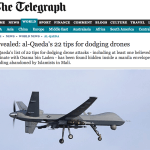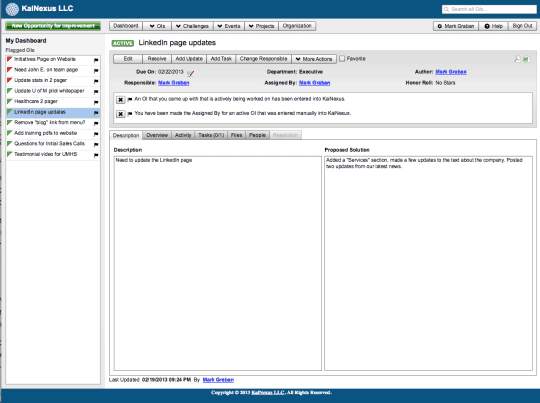
I saw an interesting article in The Telegraph: “Revealed: al-Qaeda's 22 tips for dodging drones.”
Apparently, the Al Qaeda terror network is responding to the U.S. drone attacks by developing and sharing ideas, tips, and methods for avoiding attack with each other. I hate to say it and I'm certainly no supporter of Al Qaeda… but it sounds like “Kaizen.”
“Kaizen,” of course, means “change for the better.” Kaizen is often characterized by simple, low-cost solutions to problems, often valuing “creativity over capital.” It's a core “Quick and Easy Kaizen” principle that you document and share improvements as they are made, as we document in our book Healthcare Kaizen.
Many healthcare organizations are lacking a “culture of continuous improvement,” although many aspire to it. Either organizations don't have the right culture or the right mechanisms for gathering ideas so they don't get forgotten about. Or, they don't have a good mechanism for sharing their implemented ideas with other departments or sites within their system.
From The Telegraph:
The document includes advice such as “hide under thick trees” (believed to be bin Laden's contribution), and instructions for setting up a “fake gathering” using dolls to “mislead the enemy”.
Found by the Associated Press in a building in Timbuktu, the ancient city occupied by Islamists last year, the document is believed to have been abandoned as extremists fled a French military intervention last month. It is a Xeroxed copy of a tipsheet authored by a Yemeni extremist that has been published on some jihadi forums, but that has made little appearance in English.
“Hide under thick trees” is certainly a low-cost solution to their problem.
Al Qaeda is apparently using the “sneaker net” to share ideas – photocopied sheets – as well as the internet.
My Healthcare Kaizen co-author's hospital system in Indiana does similar things — sharing ideas, not hiding under trees. They share ideas on bulletin boards in departments and in hallways AND they built a home-grown database to share the ideas across different hospitals online. KaiNexus, the technology company I work with, has web-based software that allows people to share ideas easily across an organization while they are in progress or after they are completed.
Again, from the article:
“This new document… shows we are no longer dealing with an isolated local problem, but with an enemy which is reaching across continents to share advice,” said Bruce Riedel, a 30-year veteran of the CIA, now the director of the Intelligence Project at the Brookings Institute.
While some of the tips are outdated or far-fetched, taken together, they suggest the Islamists in Mali are responding to the threat of drones with sound, common-sense advice that may help them to melt into the desert in between attacks, leaving barely a trace.
“These are not dumb techniques. It shows that they are acting pretty astutely,” said Col Cedric Leighton, a 26-year-veteran of the United States Air Force, who helped set up the Predator drone program, which later tracked Osama bin Laden in Afghanistan.
If global healthcare is fighting waste as a common enemy (poor quality, high cost), then shouldn't we be reaching across departments, and even across continents, to share advice?
Here is the entire Al Qaeda list (PDF).
We use our own software internally within the team at KaiNexus (as our team is scattered about many cities in Texas and beyond). We “eat our own dog food” as they say.
Here is a list of the current improvement tips (including projects or small improvements I'm working on) that appear on my dashboard when I log in:
I can search completed ideas to see or remember what we improved in the past. If I were part of a multi-site health system and I worked in a pharmacy in Site A, I could see what my colleagues at Site B and Site C were working on in REAL TIME and I can see their history.
It's helpful to us when we use KaiNexus internally. But updating our LinkedIn page isn't a matter of life or death. Kaizen *is* a matter of life and death in healthcare… and in the global war on terror. I hope Al Qaeda does this LESS effectively over time. I hope hospitals get MORE effective at it, regardless of what methods they use.
Please scroll down (or click) to post a comment. Connect with me on LinkedIn.
Let’s build a culture of continuous improvement and psychological safety—together. If you're a leader aiming for lasting change (not just more projects), I help organizations:
- Engage people at all levels in sustainable improvement
- Shift from fear of mistakes to learning from them
- Apply Lean thinking in practical, people-centered ways
Interested in coaching or a keynote talk? Let’s talk.
Join me for a Lean Healthcare Accelerator Trip to Japan! Learn More










